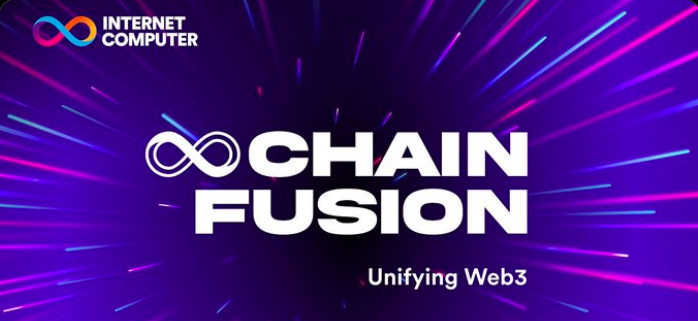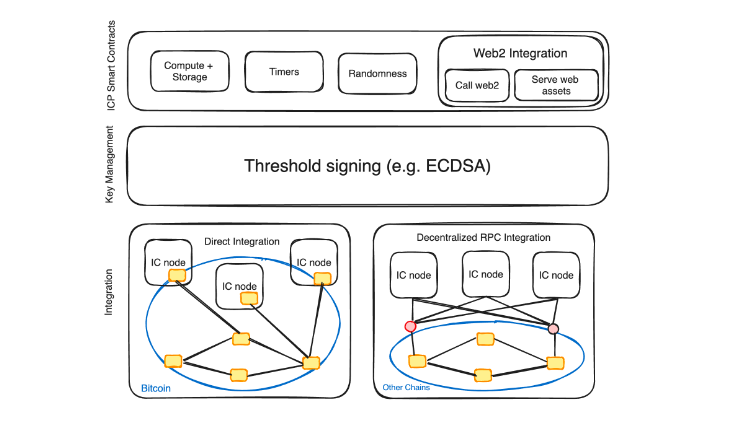Chain Fusion: Bridging the Gap Between Blockchains with the Internet Computer Protocol
 Pawan K
Pawan KTable of contents

Blockchain technology has made significant strides, but interoperability remains a critical hurdle. Chain Fusion, a revolutionary solution by the Internet Computer Protocol (ICP), addresses this challenge by enabling decentralized interconnection with multiple blockchains. This eliminates the need for a single trusted intermediary, such as a bridge, through decentralized bi-directional communication and the ability of ICP smart contracts to sign and submit transactions to other chains.

Enhancing Smart Contracts and Dapps with Chain Fusion:
Web2-like User Experience: Chain Fusion offers a seamless user experience similar to traditional web services. Thanks to low costs, fast finality, and a reverse gas model, users can interact with smart contracts using a standard browser without needing a crypto wallet or relying on a single point of trust.
Performance: ICP smart contracts support a wide range of web services, from social networks to AI models. Chain Fusion leverages this power to build more robust decentralized applications (dapps) by combining non-ICP smart contracts with ICP's decentralized compute power.
Storage: With a competitive pricing model, ICP smart contracts provide up to 400GiB of on-chain storage. Chain Fusion extends these storage capabilities to non-ICP dapps, enabling comprehensive on-chain data storage.
Autonomy: ICP smart contracts can schedule messages independently, allowing them to operate without user inputs or external arbitrage. Chain Fusion brings this autonomy to non-ICP smart contracts while maintaining decentralization.
Interoperability with Web2: ICP’s HTTPS outcall feature allows canisters to interact with any web service deterministically. Chain Fusion extends this Web2-Web3 interoperability to non-ICP dapps.

Diverse Use Cases Enabled by Chain Fusion:
Trustless Cronjob Service: Automate periodic functions for Ethereum smart contracts without relying on external services.
Decentralized Borrowing Protocol: Issue stablecoins backed by Bitcoin as collateral.
Multi-Chain Asset DEX: Facilitate seamless trading of assets across different blockchains.
In-Browser Multi-Chain Wallet: Manage assets from various blockchains within a single browser-based wallet.
On-Chain Frontend: Host immutable or DAO-managed frontends for smart contracts on other blockchains.
Decentralized Oracle: Connect Web2 services with smart contracts on other blockchains via HTTPS outcalls.
Security and Integration:
Chain Fusion employs threshold signing, also known as chain-key cryptography, to ensure secure key management and signing. This method distributes private key shares among nodes, preventing any single point of failure. ICP offers direct integration with Bitcoin and decentralized RPC integration with Ethereum, ensuring secure and efficient interactions with external blockchains.
Building with Chain Fusion:
Developers can leverage several building blocks to enhance non-ICP smart contracts or integrate Chain Fusion into existing ICP dapps:
Chain-Key Tokens: Represent native Bitcoin, Ethereum, and ERC-20 tokens on ICP.
EVM RPC Canister: Communicate with Ethereum or other EVM blockchains.
Threshold Signatures: Implement threshold ECDSA and Schnorr protocols.
HTTPS Outcalls: Make replicated calls to external web services.
Bitcoin API: Interact directly with the Bitcoin blockchain.
Chain Fusion is poised to transform blockchain interoperability, offering unparalleled capabilities and security. As we continue to explore the potential of decentralized technologies, Chain Fusion stands out as a pivotal innovation in the blockchain ecosystem.
Subscribe to my newsletter
Read articles from Pawan K directly inside your inbox. Subscribe to the newsletter, and don't miss out.
Written by

Pawan K
Pawan K
Pawan Kumar is a Google cloud arcade Facilitator,Multi-cloud Mentor,web3 developer, machine learning engineer, coding enthusiast, lifelong learner, and open-source contributor. He is a community member and collaborator at Omdena, an open-source platform.He is recipient of prestigious AWS AI/ML Scholarship program.Additionally he also has experience in Salesforce Devops and Copado Devops platform.He has also achieved Salesforce Associate certification and Copado fundamentals certification in a span of less than two months.